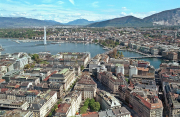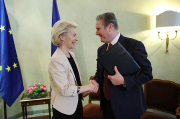
The world is facing the "moment of crisis" on climate change and cannot delay action any longer, British naturalist and broadcaster David Attenborough warned in an
interview broadcast Thursday.
"We have been putting things off year after year, we have been raising targets and saying 'Oh well, if we do it within the next 20 years," he told the BBC.
"The moment of crisis has come, we can no longer prevaricate."
Attenborough said immediate action was required. "We can't go on saying 'but there's hope' and leave it to next year. We have to change".
The veteran presenter said there had been a "huge change in public opinion" about climate change, particularly among young people, and politicians must listen.
"We have to realise that this is not playing games, this is not just having nice little debates and arguments, then coming away with a compromise," he said.
"This is an urgent problem that has to be solved. And, what is more, we know how to do it. That's the paradoxical thing, that we are refusing to take steps that we know have to be taken.
"And every year that passes makes those steps more and more difficult to achieve."
- China carbon cuts -
Attenborough is renowned for his ground-breaking wildlife programmes for the BBC, and has become increasingly vocal about the impact of climate change.
His hugely popular TV series "Blue Planet II" was credited with raising global awareness about the damage caused by discarded plastics to the world's oceans and marine life.
He spoke out on Thursday to launch a year of special coverage on climate change by the national broadcaster, which coincides with Britain's hosting of the COP 26 climate summit in November.
Attenborough said a game-changer in tackling global warming would be if China announced major steps to curb its carbon output.
"Everybody else would fall into line... That would be the big change one could hope would happen," he said.
The UN's World Meteorological Organization revealed on Wednesday that the past decade has been the hottest on record.
It warned that higher temperatures had already had dire consequences, from record sea levels to increasing ocean heat and extreme weather, and these were set to continue.
"The year 2020 has started out where 2019 left off -- with high-impact weather and climate-related events," WMO chief Petteri Taalas said.
He pointed in particular to the devastating bushfires that have been raging in Australia for months.afp









































